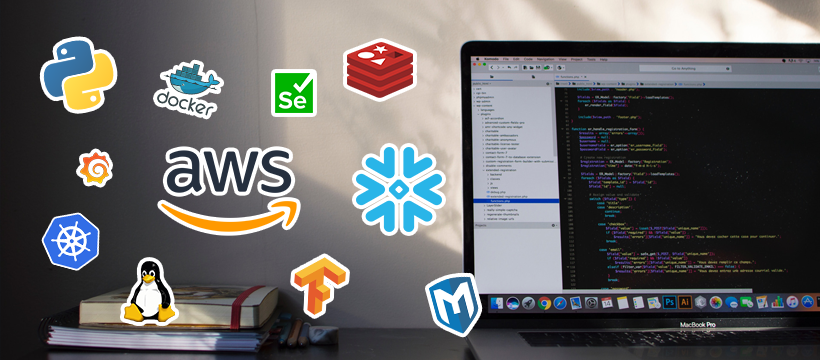Last updated on August 29, 2025
Every day the growth of technology is exponential, there will come a time when the technology you’ve just learned will be obsolete. If you’re currently exploring opportunities in the IT industry, we’re gonna tackle the article provided by Indeed about the best IT jobs for the year 2023. Below, you’ll find information that reflects the current trends and offers a chance to explore new career paths. Despite the anticipated advancements in technology, our objective is to give you an idea of what to anticipate.
Here are the top 7 most in-demand IT skills for 2023:
1. Full Stack Developer
A full stack developer is a programmer who is proficient in both the front-end and back-end aspects of web development. They are knowledgeable in a wide range of web application technologies and can handle tasks related to both the client-side and server-side of an application. This includes the development of application logic, designing and building user interfaces, managing databases, and ensuring the overall web application’s proper operation and maintenance.
Annual Salary: $129,637
Skills:
- Frontend Development (React, Angular, or Vue.js)
- Backend Development (Node.js, Python, or Ruby on Rails)
- Web Frameworks (Express, Flask, or Django)
- Version Control
- DevOps (CI/CD, Containerization, IaC)
- Testing (Jest, Mocha, or Selenium)
- Agile Methodology (Scrum or Kanban)
2. Data Engineer
The data engineer is in charge of designing, building, and maintaining a company’s data infrastructure. They work with large and complex data sets, developing tools and systems to assist data scientists and analysts extract insights from the data. This includes creating data models, building data pipelines, supervising data storage and retrieval, ensuring data precision and reliability, and designing efficient and scalable data architectures.
Annual Salary: $135,260
Skills:
- Database (SQL, NoSQL, or Hadoop)
- Data Warehousing (Redshift, Snowflake, or BigQuery)
- Big Data (Hadoop, Spark, or Kafka)
- Cloud Computing (AWS, Microsoft Azure, or GCP)
- Programming (Python, Java, or Scala)
- Data Pipeline Management
- Data Security
3. Cloud Engineer
A cloud engineer is responsible for developing, deploying, and maintaining cloud-based applications and systems. This includes configuration management, scaling applications, monitoring system security, health and performance, disaster recovery planning, and regulatory compliance
Annual Salary: $133,114
Skills:
- Cloud Platforms (AWS, Microsoft Azure, or GCP)
- Virtualization (VMware, Hyper-V, or KVM)
- Networking
- Automation (Ansible, Puppet, or Chef)
- Scripting (Python, Bash, or PowerShell)
- Security
- Containers & Orchestration (Docker or Kubernetes)
4. Backend Developer
A backend developer is a programmer who specializes in developing the server-side of web applications. They are in charge of developing the components of a web application that are not visible to the user, such as the database, server, and application logic. The developed server-side APIs will be integrated into front-end developers’ applications.
Annual Salary: $148,827
Skills:
- Server-side Programming Languages (Java, Python, Ruby, or Node.js)
- Database Management (MySQL, PostgreSQL, MongoDB, or Redis)
- Web Frameworks (Spring, Django, Ruby on Rails, or Express)
- RESTful APIs
- Server Administration
- Version Control
- Testing & Debugging
5. Site Reliability Engineer (SRE)
SREs are responsible for the design and implementation of highly resilient, scalable, and reliable systems. This includes participating in the development, implementation, and maintenance of the systems, as well as identifying and addressing any problems that may arise in order to minimize system downtime. They also handle infrastructure management, system monitoring, and capacity planning to improve the reliability and performance of the systems.
Annual Salary: $153,134
Skills:
- Operating Systems (Linux or Windows)
- Cloud Computing (AWS, Microsoft Azure, or GCP)
- Automation (Terraform, Ansible, Puppet, or Chef)
- Networking
- Monitoring (Nagios, Prometheus, or Grafana)
- Scripting & Programming (Python, Go, or Java)
- Incident Management
6. Machine Learning Engineer
An ML Engineer is a specialist who works on the development of algorithms, models, and statistical models that allow computers to learn from data and make predictions or decisions that can be used to solve real-world problems. This includes analyzing and organizing data, running tests and experiments, and generally monitoring and optimizing machine learning processes to aid in the development of high-performing machine learning systems.
Annual Salary: $153,252
Skills:
- Programming Languages (Python, R, or Java)
- Mathematics & Statistics
- Machine Learning Algorithm
- Data Preprocessing
- Data Visualization (Matplotlib, Seaborn, or ggplot)
- Deep Learning Frameworks (TensorFlow, Keras, or PyTorch)
- Software Engineering Principles (Version Control, Testing, Deployment, or DevOps)
7. Penetration Tester
A pen tester simulates a cyber attack against your computer system or application to check for exploitable vulnerabilities. They use a variety of tools to look for flaws in the target website, such as open services, application security issues, and open source vulnerabilities.
Annual Salary: $118,034
Skills:
- Networking
- Operating Systems (Windows, Linux, or macOS)
- Web App Security (Burp Suite, OWASP ZAP, or Nikto)
- Penetration Testing Tools (Nmap, Metasploit, or Wireshark)
- Programming (Python, Ruby, or PowerShell)
- Social Engineering (Phishing, Pretexting, or Baiting)
- Incident Response


















